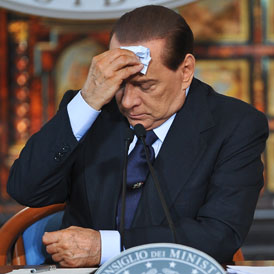Berlusconi’s future in doubt despite reform vote win
Silvio Berlusconi wins a parliamentary vote on Italy’s public finances, but loses his majority as a revolt within his own party continues to grow. Channel 4 News looks at Italy’s political future.

The Italian Prime Minister won the budget vote with 308, but 321 people refused to take part in the vote, in a clear sign that Mr Berlusconi’s grip on power is weakening.
Berlusconi needed 316 votes to retain an absolute majority in the lower house.
Earlier, Berlusconi‘s closest coalition ally, Umberto Bossi, said the 75-year-old should step down as Prime Minister and be replaced by Angelino Alfano, secretary of the premier’s PDL party.
“We asked the prime minister to stand down,” Bossi, head of the devolutionist Northern League, told reporters outside parliament.
Opposition leader Pier Luigi Bersani immediately called on Berlusconi to resign, saying Italy ran a real risk of losing access to financial markets.
“I ask you, Mr Prime Minister, with all my strength, to finally take account of the situation … and resign.”
Berlusconi’s failure to adopt reforms to defuse the debt crisis has fuelled dissent within his party, with five members of the ruling PDL party announcing on Tuesday that they would abstain from voting.
Italy’s political crisis: What happens next?
As Silvio Berlusconi is humiliated in parliament, professor of European political economy at the London School of Economics, Marco Simoni, speaks to Channel 4 News about the future of Italian politics.
Why did 321 people abstain from the parliamentary vote?
Given pressure on bond markets, it was something you didn’t want it failing. Due to current pressures on bond markets, it would hurt the country more than it would hurt Berlusconi. What was important was for the opposition to show he doesn’t have a majority so they can force a confidence vote.
What happens if Berlusconi refuses to go?
If he doesn’t resign in the next day or so, there are a number of possibilities because technically he’s still prime minister. Today’s vote wasn’t a confidence vote but it did show he doesn’t have a working majority, which suggests we’ll see a new government relatively soon.
Who will form that government?
It could be formed by the same majority or slightly larger majority. Or we could see more of a coalition government form a caretaker government, maybe headed by an independent like Mario Monti. But a likelier outcome, which should be taken with more than a pinch of salt, as it’s hard to understand what parliament are going to do, is that we’ll see very early elections.
What is the best scenario for the eurozone?
The best thing for Europe is a new government that can implement a small number of economic reforms showing that Italy is economically solvent, and for that government to bring the country to new elections. A small range of reforms will demonstrate the resolve for dealing with underlying growth issues and show that Italy is not comparable to Greece in any sense- not economically, not by debt or its deficit.
If a new unity government doesn’t get enough backing, could it force early elections? And would that further unsettle the eurozone?
Early elections might be bad if there isn’t a clear plan. What we don’t want now is political confusion. There will be an irrational reaction from markets if they can’t read the outcome, and if elections are called early, anything could happen.
Losing his majority
The opposition plans to present a no-confidence motion against him in the next few days, but it might not take place until next week.
Mr Berlusconi has survived more than 50 confidence votes in his career, but it is widely expected that the current revolt in his own party will force him to go.
Italy, as the third biggest economy in the eurozone, continues to cause market jitters due to its mounting debt.
Borrowing rates on the county’s debt have soared to record levels of the euro-era. Yields on Italy’s 10-year benchmark bonds rose to 6.74 percent on Tuesday before dropping back slightly.
Analysts warned that Italy was reaching the point where Portugal, Greece and Ireland had been forced to seek a bailout.
Refusing to go
Berlusconi has so far rejected calls to step down, taking to his Facebook page to blast rumours of his resignation as “groundless”.
His defiance came after a weekend spent trying to win back the support of enough MPs to avoid humiliating defeat in the vote.
International pressure is mounting on Berlusconi to step down, but if he does not resign, he could be ordered by President Giorgio Napolitano to call a confidence vote.
Possible contenders to step in and lead a new unity government include former European Commissioner Mario Monti, Angelina Alfonso and Berlusconi’s closest aide, Gianni Letta.